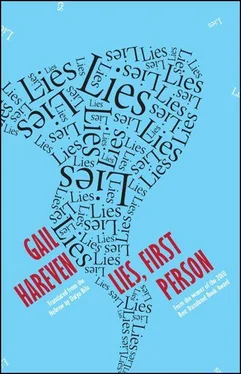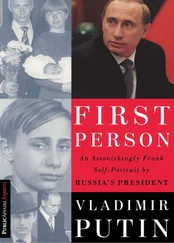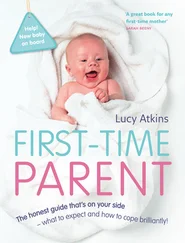Even the constantly thrilled and amazed Alice understands that she will never know if the little girl she encountered at the Wailing Wall is the same one whose prayer flew up into the air opposite the grave. Perhaps there were two sick little girls — she reflects at the end of the story — and perhaps there was only one. But if there were in fact two, all we can do is wish: if only this miraculous encounter was a sign from the cosmos, a cosmic sign that both of them were cured.
If only it wasn’t me who had written this transparent tale. But I did write it, and I wrote it without the faintest idea of what and who I was writing about. It was so forced and affected that on the Friday it came out even Menachem refrained from calling me to give me his reactions, but I was so obtuse then that I didn’t even wonder about his silence. Was I transparent to him? Or perhaps Rachel read me between the lines? I think not, I would like not to believe it, and in any case it’s not important any more. Not important, no, only disturbing. Two sick little girls, I wrote. If only they would get well, I wrote. Unthinkingly I faked this bluff. Unthinkingly I faked, because that’s what I was like and it didn’t bother me a bit. And for years for a large part of my time I definitely enjoyed wandering the city in pigtails.
Later on I’ll give it my attention. I have to, it’s impossible not to think. Later on I shall certainly give it attention, a lot of attention — but not now, not at this minute, when there’s something else entirely on the agenda and when there’s another truth I have to tell:
Notes that fall from the Wall are indeed given a respectful burial just as I wrote, whereas as notes with messages left behind by hotel guests are thrown into the trash.
It occurred to me, it definitely occurred to me that the police might well have confiscated the messages received by the missing person and examined them. But weeks went by and nobody from the police contacted us to ask us any questions, or if they did, and I don’t think they did — my protective husband, my guardian angel, didn’t tell me about it. If that’s what actually happened, I’m okay with it, and even now, at a distance in time, I have no need to ask him and to know.
Once we returned home it was clear to me that the possibility of the police tracking us down was purely theoretical, and that the truth was there was nothing more to fear. I did what was necessary to make sure that there would be no deviations from the successful outcome of our plot. I acted according to the rules of the game. But in fact, on our way back, when I was busy preparing our alibi, I already knew, I knew for certain, that all this preparing-for-any-eventuality was superfluous, and that it was only a mental game that Oded and I were supposed to play, as if in obedience to the rules of some genre.
There would be no deviation, because the deviations were over and done, and from now on there was no more terror but only flickers and flashes of panic. My husband and I returned home, we were at home, and in the land of I-shall-fear-no-evil you don’t fear evil.
The new time opened out in front of us. The Garden of Eden once more opened its gates, and I was determined not to delay and not to set up a way station on the threshold.
Our relief grew steadily, whether quickly or slowly. In the first days the domestic environment seemed fragile and gleaming, as if everything was made of crystal sparkling with light. I remember myself holding a frying pan with tremendous care — the bottom reflected a ray of sunlight, a spot of refracted orange light danced on the wall — and I held onto the pan with both hands so it wouldn’t shatter in pieces.
Carefully I moved between one precious object and another, until the fragility gradually abated and only the gleam remained.
Three or four weeks passed before I started getting in touch with friends and bringing people back into my life, and in a rather vague way I prepared myself for difficulty: decades of reading had prepared me for the feeling that what I had done had set up a barrier between me and the rest of the world. I didn’t spend a lot of time thinking about it. Perhaps because I didn’t think much, the apprehension didn’t swell in me. I felt no real anxiety, but when I started to make contact again I was nevertheless sometimes astonished by the ease of the contact and the absence of any barrier. When I was with people it did sometimes cross my mind that I had a secret, but this awareness when it surfaced was almost neutral, neutral and weightless as the fact that I had brown eyes. Not-man had disappeared, and it seemed that the weight of the secrecy had disappeared with him.
Three or four weeks passed before I got in touch with a girlfriend and suggested that we go to buy sandals together, but even before that, even before I started contacting people, when Oded was still following the news on the internet and keeping his dawn watch in the garden — I had already given myself back our grocer’s morning smile. I had already recovered the pleasure of eavesdropping on the conversations of passersby, the surprising charm of an incorrect word, the smell of freshly ground coffee, the smoothness and sweetness left by the taste of halva between my teeth. I recovered the sight of the tender shoot of a fig tree breaking out bravely between the paving stones, the sense of solidity afforded by stone walls, even when they turn pink in the evening. I recovered many things like this.
The relief grew steadily, and the new freedom left more and more space for happiness. After what I had survived, after what we had been through — who would begrudge me my delight in coffee and halva, and who would say that we had no right?
As for books, I confess that I needed time, and that for weeks everything I tried to read still seemed boring, absurd, or trivial. Again and again I bent over the water in my thirst, and each time the water receded and my mouth remained parched.
My road back to reading was completely and accidentally paved once, in groping thirst, I opened the Bible and began to read the Book of Judges. The bible was neither boring nor trivial, and I spent weeks with Judges, Kings, and Prophets.
Like a turbaned Orthodox woman moving her lips in the bus over a little Book of Psalms, I carried the Bible with me wherever I went: I read it in a café waiting for friends, I read it in the hotel in Safed where we went for the weekend with Chemi and Rachel, and I read it almost every night before gong to sleep.
“What is this, Elinor, in the end you’ll be like Elisheva.”
I ignored the teasing and went on reading. I liked the severe Old Testament God: his passionate temperament and acts seemed more convincing and believable to me than those of many other fictional characters I knew. I understood this fiery God and occasionally, in some strange way, it seemed to me that he understood me too.
For many days I clung to my blue-covered Bible, until in the end — perhaps simply because I persevered in the habit of reading — I found that I could read other books too.
In Zion Square, close to the place where I had collapsed before having my sister hospitalized, a frightening old beggar stands on a permanent spot. Twenty years ago this man had terrified my sons with a smoky voice that seemed to rise from the depths of some enormous sound box, and they were so frightened of him that they would always tug my hand and demand that we make a wide detour around the square. On purpose, I think, he would suddenly hurl this dreadful voice at them to frighten them, and so he continued to do to other passersby in all the years that followed.
One morning, not long ago, I walked past this beggar, and all of a sudden, in a quite low, perfectly normal voice, he asked me to give him a few shekels. I stood still for a moment to ascertain that the voice was indeed coming from his throat. I had already become so accustomed to the terrible voice that it had ceased to frighten me, but that morning, when I dropped a few coins in his hand — his “thank you, ma’am” sounded quite natural and normal.
Читать дальше












